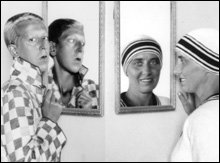
LOVER OTHER: Barbara Hammer mirrors her subject’s æsthetics.
|
After the heights of Brokeback Mountain, will the course of gay cinema be all downhill? Does the success of Ang Lee’s Oscar-winning, box-office-busting tearjerker mean that the mainstream has embraced gay characters and narratives? Or has it merely absorbed them and reduced them to its own common denominator? This year’s Gay & Lesbian Film/Video Festival at the MFA doesn’t so much confront these issues as it embodies them. At the very least I’d have expected such questions to come up in Lisa Ades & Lesli Klainberg’s documentary Fabulous! The Story of Queer Cinema (2006; May 21, 5:30 pm, followed by a panel discussion), especially since the talking heads include Ang Lee and Brokeback’s producer, James Schamus. Instead, Schamus and Lee spout familiar bromides about how the universal experiences of love and loss draw in those who might otherwise be put off by the gay thing. They don’t consider the possibility that the gay thing might be a gimmick exploited to tart up a stale Hollywood formula.
As history, Fabulous offers minimal analysis and excessive superlatives. At least we have perennial troublemaker John Waters, who argues that gay filmmakers should cling to their outsider status and recognize that their goal is to provoke, not conform. And give credit to critic B. Ruby Rich, who calls for films that explore new and extraordinary lives and experiences, not queer-tinged rehashes of familiar Hollywood products.
What films in this year’s festival would satisfy Waters or Rich? Perhaps Karen Everett’s Women in Love (2005; May 19, 8:30 pm), a video diary in which the filmmaker wrestles with the alternatives of monogamy, non-monogamy, polyamory, and promiscuity. At times, self-love seems the dominant inclination, along with self-loathing, as Everett can’t separate herself from her constantly recording video camera, whether she’s having sex with her current lover or interrogating former ones or analyzing her feelings about these obsessions. Her travails are infuriating and familiar. She should take a cue from the happiness and stability of her friends Shar and Jackie, one of the most appealing couples you’ll see on screen.
Equally appealing if not as happy and stable are the couple in Barbara Hammer’s documentary Lover Other (2006; May 17, 6:30 pm, presented by the Boston Jewish Film Festival and Women in Film & Video/New England), a collage portrait of Claude Cahun and Marcel Moore. Born Lucie Schwob and Suzanne Malherbe, the two were bought together when their divorced parents married each other. They fell in love, became fixtures in the Parisian Surrealist scene, and fled to the British Isle of Jersey when the Nazis rose to power in the ’30s. The Germans occupied the island in 1940, and the pair fought back with dadaist provocations — notes, drawings, and sculptures — that resulted in their arrests in 1944. They were tried and sentenced to death.
Hammer mirrors her subjects’ æsthetics by intercutting their photo-collages and self-portraits — which resemble images from Khnopff, Klimt, and Kenneth Anger — with interviews with fellow Jersey resisters and a re-enactment of a script discovered among the pair’s papers. The latter feels clumsy and conventional compared with the rest of the film, but Hammer’s eerie and abstract soundtrack helps overcome such lapses.